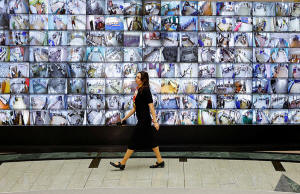Independent vote monitor says Russian elections are 'most secret' ever
 Send a link to a friend
Send a link to a friend
 [March 16, 2024]
By Mark Trevelyan and Gleb Stolyarov [March 16, 2024]
By Mark Trevelyan and Gleb Stolyarov
LONDON (Reuters) - The head of an independent vote-monitoring group that
Russia has labelled a "foreign agent" says the presidential election
that began on Friday and is widely expected to re-elect Vladimir Putin
is the least transparent the country has seen.
Stanislav Andreichuk, co-chairman of Golos (Voice), said the use of
electronic voting for the first time in a presidential election, and the
fact that voting is spread over three days, both serve to make the
process more opaque.
"These are the most closed, most secret elections in Russian history,"
Andreichuk told Reuters in a telephone interview, referring to the 33
years since the break-up of the Soviet Union.
The Kremlin says the election, which began on Friday, is a proper
democratic process and predicts that Putin will win on the basis of
overwhelming popular support. Election authorities say it will be
scrutinised by 706 foreign observers and as many as a third of a million
Russian observers nominated by candidates, political parties and social
organisations.
Andreichuk said high turnout figures on day one of the election
reflected pressure on people by managers in the workplace to make sure
they voted.
"People are going and voting first thing in the morning because their
bosses make them. It's very convenient to keep track of them because
it's a working day," he said.
Reuters has requested comment from the electoral commission on whether
workers are under instructions from bosses to vote.
Six sources told Reuters on the eve of the election that managers of
state companies and organisations were exerting pressure on staff to
vote. Four of these said people had been instructed to provide evidence
of casting their ballots.
"At our factory, everyone was told to vote on March 15 and send a selfie
to the boss," said one employee at a state-owned company.
A high turnout is important to the Kremlin as Putin, two years into the
war in Ukraine, seeks to show the country is behind him.

[to top of second column]
|

A woman walks past an information electronic screen at the
headquarters of Russia's Central Election Commission during the
presidential election in Moscow, Russia March 15, 2024. REUTERS/Evgenia
Novozhenina

Supporters of opposition politician Alexei Navalny, who died in an
Arctic penal colony last month, have urged people to protest by
turning out en masse to vote at noon on Sunday.
Official data showed turnout on Friday was over 33% for the country
as a whole but higher than 60% in parts of Siberia and the far east.
It was just under 70% in Donetsk and Kherson, two Russian-occupied
regions of Ukraine. The government in Kyiv has called voting there
illegal and void.
ELECTRONIC VOTING
Andreichuk said electronic voting - available for the first time in
a presidential election to people in about a third of the country -
was a particular concern because it was open to manipulation and the
results were impossible to check.
The spread of voting across three days raised the possibility that
ballot boxes could be tampered with overnight, he said.
Andreichuk also noted there were only three alternative candidates
to Putin, the fewest he has faced in any of his five elections, and
said no open public discussion of the country's problems had been
allowed to take place.
"Censorship has been introduced, there's repression in the country,
part of the opposition is behind bars. So these elections are just
unfree and undemocratic from the start."
Golos is not allowed to send observers. It was first labelled a
"foreign agent" in 2013, having angered the authorities by
publishing evidence of fraud in a 2011 parliamentary vote and a 2012
presidential election won by Putin.
Another of the organisation's leaders, Grigory Melkonyants, was
arrested last August and accused of involvement with an
"undesirable" organisation. He is still in prison, awaiting trial.
(Reporting by Mark Trevelyan and Gleb Stolyarov; Editing by Frances
Kerry)
[© 2024 Thomson Reuters. All rights reserved.]This material
may not be published, broadcast, rewritten or redistributed.
Thompson Reuters is solely responsible for this content. |